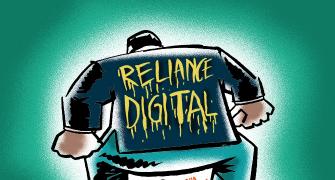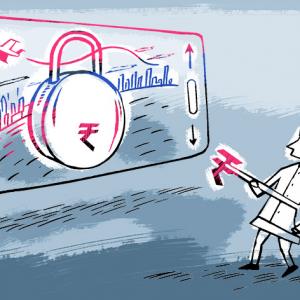The strategy of returning cash to shareholders through stock purchases could hinder their digital expansion plans
Illustration: Uttam Ghosh/Rediff.com

Share buybacks have become all too frequent among Indian IT firms over the past year as piling cash reserves and a lack of alternative opportunities for investment have prompted these tech giants to return surplus cash to investors.
Last year, 11 IT firms bought back nearly Rs 45,300 crore through such programmes.
In a way, the domestic IT firms have joined a growing global trend, where large firms enrich their shareholders with such programmes on a regular basis.
Analysts are of the opinion that as share buyback is one of the most tax efficient methods of returning cash to investors in comparison to other instruments like a dividend payout or even a bonus issue, companies are increasingly taking this route.
“Returning cash to shareholders through stock buybacks is a growing global trend. In the case of the Indian IT services firms, it is increasingly becoming a common practice,” said Peter Bendor-Samuel, CEO of global research firm, Everest Group.
This practice in the context of IT firms was initiated by activist hedge fund Elliott Management, which advocated vigorously with US-based IT services firm Cognizant, to return a significant portion of its cash on its balance sheet to shareholders.
Subsequently, Cognizant reached an agreement with Elliott to return $3.4 billion to shareholders through a buyback programme.
"This trend was then picked up by both Infosys and TCS," Samuel added.
In June this year, the TCS board approved a buyback programme of Rs 16,000 crore at Rs 2,100 per share, making it the second year in a row to conduct such buybacks.
The company had bought back Rs 160 billion worth of shares in 2017.
HCL Technologies, India’s fourth-largest IT services company, was the second IT firm to announce such a share buyback programme worth up to Rs 40 billion this month.
The Noida-based company in May last year had bought back Rs 3,500 crore worth of shares at Rs 1,000 apiece.
Apart from TCS and HCL Technologies, Infosys also conducted such a programme last year to buy back Rs 13,000 crore worth of shares.
Its cross-town peer, Wipro followed suite and bought back shares worth Rs 11,000 crore in 2017.
According to data compiled by Prime Database, 50 companies bought back shares worth Rs 55,236 crore in 2017 from Indian bourses with 82 per cent of such buybacks conducted by domestic IT firms.
“We tend to see buybacks when management feels their company is undervalued and has sufficient cash reserves.
"As Indian companies remain coy on inorganic growth while the market has seen a steady growth momentum, this is hardly a surprise,” said Tom Reuner, managing partner (business operations strategy) at HfS Research.
Despite seeing a steady rise in overall business with sound cash flow, the growth story of Indian IT remains mostly organic.
While domestic IT firms have done acquisitions, the deal sizes have not been more than a few millions in the last two decades.
This emphasis on growing business by building up own capability has in turn led to huge cash reserve on their balance sheet.
“Indian IT firms have grown organically. They have done small acquisitions but mostly they were growing by building capability,” said Siddharth Pai, a former outsourcing advisor and founder of Siana Capital, a venture fund management company.
"So, if the management is sitting on huge piles of cash with no concrete measure of deploying them in areas which can yield better returns, they should return such surplus cash reserve to shareholders," he added.
According to industry experts, cash reserves with big IT firms yield 5-6 per cent return post tax, while it can yield up to 12 per cent if that money is returned to investors.
“If you compare investors, they are actually smarter than the company and money at their hand can yield up to 10-12 per cent post tax return," Pai added.
Also, high cash reserve on the balance sheet has depressing impact on the Return on Equity (RoE) and Earnings per Share of a company.
So, from the management's perspective, share buyback also makes a lot of sense as it pushes up the RoE and EPS of the company, which impact the firm's share price positively.
"If you compare share buyback to a dividend issue, then you will see buyback is a lot more tax efficient as the company doesn't have to pay dividend distribution tax (DDT).
"Also, buyback pushes up EPS and RoE of the company by reducing the float post the buyback,” said Harit Shah, senior analyst at Reliance Securities.
Top IT firms have enough cash reserve to take care of their investment needs even after conducting these buybacks. TCS had a net cash reserves of Rs 47,700 crore by the end of March 2018, which indicates that it has enough financial muscle to invest in new technologies in the digital space post the proposed buyback this fiscal.
Apart from huge cash reserve position, most IT biggies are also generating sound free cash flow, which adds up to their kitties.
Another rationale for rising buybacks also lies with the sectoral outlook.
IT industry after suffering a tepid demand environment is now showing signs of uptick.
"During recessionary times, companies usually hold on to cash. But, when outlook improves, returning surplus cash to investors is fairly logical. And under this process, conducting share buybacks benefits investors," said Shriram Subramanian, managing director of InGovern Research Services.
However, analysts have also pointed out risks to rising buyback offers by domestic IT firms saying that with increasing focus on digital revenue, companies may have to invest in this space to stay competitive in the long run and cash reserve could come in handy for future M&As, which will be a significant part of this strategy.
“As onset of digital, automation and DevOps is challenging the dependency on labour arbitrage, this strategy is likely to come under more scrutiny as the macro environment is likely to worsen,” said Reuner of HfS Research.










